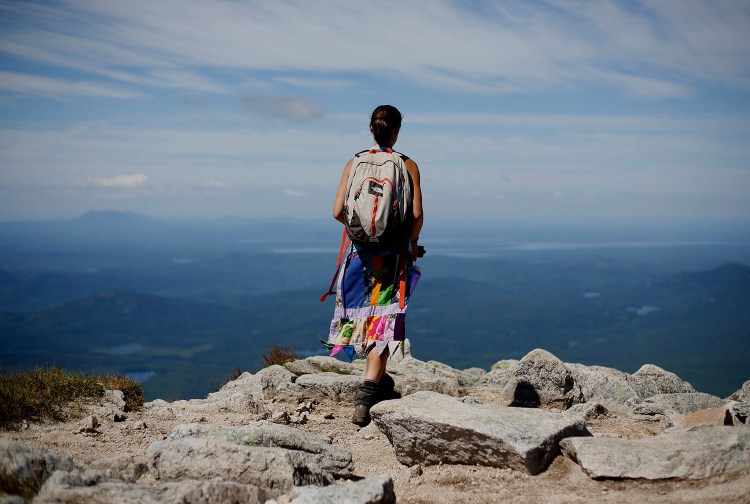The organization that oversees the Appalachian Trail has launched an intensive education campaign to address concerns that Baxter State Park officials have about the growing number of long-distance hikers entering the wilderness park to climb Mount Katahdin.
On Monday, the Appalachian Trail Conservancy opened a visitor’s center in Monson to help hikers prepare for the final 115-mile stretch of the trail and to educate them about a new permit issued by Baxter State Park. For the first time, Baxter is requiring long-distance hikers to receive a permit before summiting Mount Katahdin, the northern terminus of one of the world’s best-known hiking trails.
Although the new policy will not affect most hikers climbing Maine’s highest peak, Baxter officials could use the permits in the future to cap or limit the number of ascents by “thru-hikers” – those trekking the entire 2,190-mile trail – if park officials’ concerns are not addressed.
“We are trying to preserve the special nature of hiking on the AT and help manage those increasing numbers” of hikers, said Ron Tipton, executive director of the Appalachian Trail Conservancy. Baxter’s permitting system, Tipton said, is an “example of the kind of trail management that is going to be necessary as we see the popularity of the trail continue to increase.”
The permits, as well as what Tipton described as a “trail-long effort to educate people,” are a direct response to warnings from Baxter officials that the Appalachian Trail could be re-routed out of the park unless those concerns are addressed.
Interest in thru-hiking the trail has increased dramatically over the past 20 years, putting a strain on park managers throughout the trail corridor. The majority of thru-hikers start in Georgia in the spring and end atop Katahdin in late summer or early fall, which creates a logistical challenge for staff in the wilderness park. Baxter officials have said thru-hikers consume a disproportionate share of staff resources and occasionally flout Baxter’s restrictions on camping, hiking in large groups and excessive celebrations atop Katahdin.
“Everyone is working very hard to address all of the issues that were put forward,” said Jensen Bissell, director of Baxter State Park.
For the time being, the permits will help Baxter staff manage long-distance hikers and will serve as a memento for hikers, who can receive a “completion date” stamp on their card. Baxter officials are not limiting the number of hiker permits this year or adding any restrictions on long-distance hikers. But the permitting system could provide a framework for future changes to the way staff and the park’s three-member governing board, the Baxter State Park Authority, manage thru-hikers if the number of trail users continues to rise.
“We are issuing an unlimited number of (permit) cards this year, but that may not be the case in the future,” said Bissell, who noted that 1,700 northbound long-distance hikers summited Katahdin last year. “I think there might be a point, around 2,000 (hikers), where the authority says we don’t want to issue any more than that.”
Baxter officials first expressed concerns about rising Appalachian Trail usage several years ago. But the issue became public last summer after Bissell used the park’s Facebook page to publicly criticize ultra-marathoner Scott Jurek for his mountaintop celebration after completing the trail in a record-setting 46 days. Bissell used the incident to highlight park officials’ concerns about the behavior of some thru-hikers and to reiterate, in frank terms, that the trail ends atop Katahdin only by permission of the Baxter State Park Authority.
“The authority is currently considering the increasing pressures, impacts and conflicts that the Appalachian Trail brings to the park and if a continued relationship is in the best interests of Baxter State Park,” Bissell wrote in a July 2015 post that generated nearly 1,000 comments.
That warning sparked a new round of urgent meetings among Baxter officials and representatives of the Appalachian Trail Conservancy, the National Park Service, and Maine and national hiking organizations.
Monday’s grand opening of the Appalachian Trail Visitor Center in Monson – at the southern end of the trail’s famed 100-Mile Wilderness – is one product of those discussions.
The center will be staffed full-time through Oct. 16 by two people who will help visitors prepare to hike through a 100-mile stretch of woods with no towns, stores or even paved roads. Hikers can also pre-register for their Baxter State Park permits and hear three key messages before their Baxter visit: hike up Katahdin in smaller groups, celebrate quietly atop the mountain and save the alcohol for Millinocket or other towns.
The Appalachian Trail Conservancy, based in Harpers Ferry, West Virginia, is also working with the Friends of Baxter State Park, the Maine Appalachian Trail Club and other trail groups to educate thru-hikers about Baxter’s unique rules. Those rules – including a controversial policy prohibiting dogs – were directed or inspired by the strict deeds of trust that the park’s namesake, former Gov. Percival P. Baxter, attached to the land when he donated it to the state beginning in 1931.
Tipton, a former thru-hiker, said the vast majority of people who hike the trail are respectful. But he hopes the “trail-long” education campaign, in conjunction with Baxter’s permitting system, will help avoid a cap on thru-hikers summiting Katahdin or other restrictions.
“This is an all-out effort,” Tipton said of the awareness campaign. “We are already doing this on our website, on social media and we are trying to reach them (on the trail) so we can provide a better hiking experience for them and also for Baxter State Park.”
Bissell seemed encouraged by the steps taken by the conservancy and other groups, but he remains concerned over the longer term about the challenges posed by the upward trend in thru-hikers. Their numbers have increased by an average of 8 percent a year, from just 359 in 1991 to 2,137 last year.
“The Appalachian Trail Conservancy has a chance to help us with this,” Bissell said. “It is all about the numbers.”
Send questions/comments to the editors.




